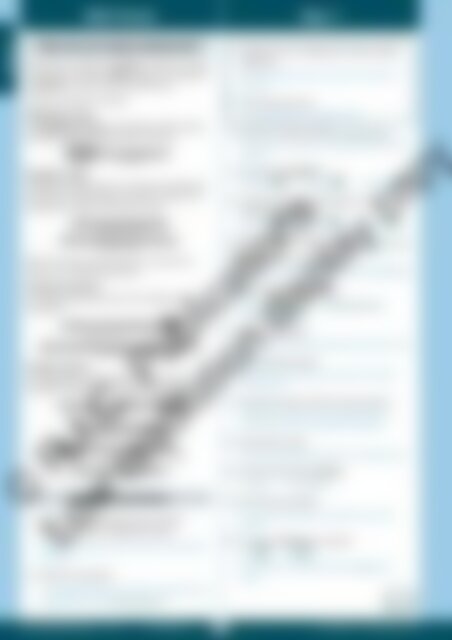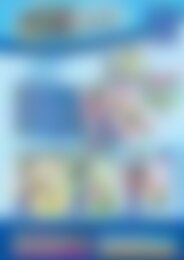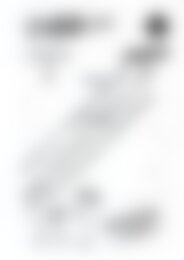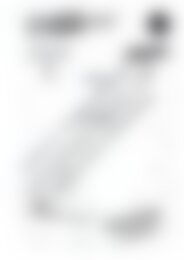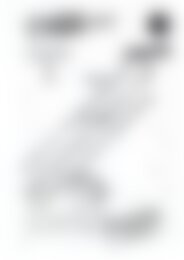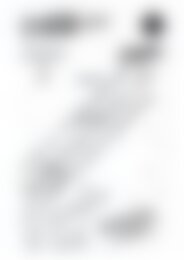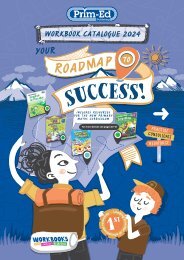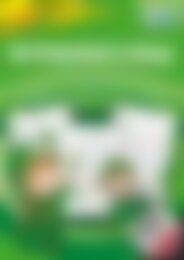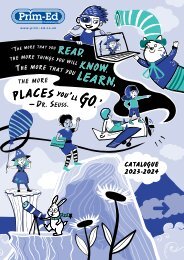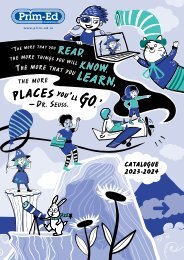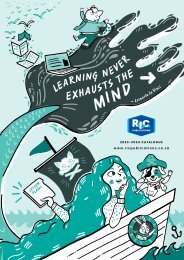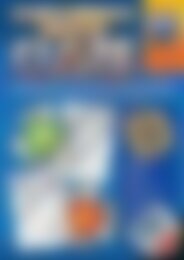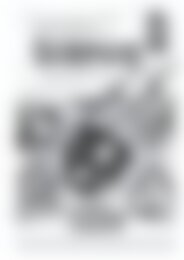6225RB New wave English skills practice Book F.LR watermark
Create successful ePaper yourself
Turn your PDF publications into a flip-book with our unique Google optimized e-Paper software.
Skill focus<br />
Day 1<br />
Week 9<br />
How do we make sentences?<br />
Sentences are made from clauses. A clause is a group<br />
of words that includes a subject (person or thing) and<br />
a predicate (an action they are performing).<br />
There are two types of clauses:<br />
Independent clause<br />
An independent clause is sometimes called a simple<br />
sentence because it makes sense on its own.<br />
Joseph ran to the playground.<br />
subject<br />
predicate<br />
Dependent clause<br />
A dependent clause also has a subject and predicate,<br />
but it does not make sense on its own. It relies on an<br />
independent clause to help make it clear.<br />
Joseph ran to the playground<br />
independent clause<br />
before anyone else could catch up.<br />
dependent clause<br />
Often, two clauses are joined with a conjunction to<br />
make a more interesting sentence.<br />
Compound sentences<br />
Two simple sentences joined in the middle using a<br />
conjunction.<br />
Joseph ran to the playground, and<br />
independent clause<br />
coordinating conjunction<br />
he got there before anyone else could catch up.<br />
independent clause<br />
Complex sentence<br />
An independent and dependent clause joined by a<br />
conjunction at the start or in the middle of a sentence.<br />
Joseph ran to the playground before<br />
independent clause<br />
anyone else could catch up.<br />
dependent clause<br />
conjunction<br />
Before anyone else could catch up,<br />
conjunction dependent clause comma<br />
Joseph ran to the playground.<br />
independent clause<br />
Practice questions<br />
1. Underline the independent clause (simple<br />
sentence). Circle the dependent clause.<br />
My bike rolled down the hill while I was tying my<br />
shoelace.<br />
2. Write the conjunction.<br />
The kittens pranced around Mum’s legs while she<br />
prepared their food.<br />
1. Underline the two independent clauses (simple<br />
sentences).<br />
Ella was relieved when she saw her friends at<br />
the park.<br />
2. Circle the conjunction.<br />
I was feeling sick, so I stayed home.<br />
3. Correct the spelling mistake.<br />
The thunder rumbled and litening flashed across<br />
the sky.<br />
4. A synonym for tattered is:<br />
tattooed.<br />
shabby.<br />
rambling.<br />
5. In which word are the letters en not a prefix<br />
meaning cause to?<br />
enlarge<br />
enforce<br />
enough<br />
6. The contraction in I’d have means .<br />
7. Circle the correct homophone.<br />
The rabbit disappeared into the small hole/whole.<br />
8. Write the plural of each noun.<br />
alibi taxi<br />
ski<br />
9. Add the apostrophe.<br />
Some of my roofs tiles had been lost in the storm.<br />
10. Circle the direct speech.<br />
During the storm, said Joe, we lost a few tiles<br />
from the roof.<br />
11. Add speech marks to show the direct speech.<br />
Others have suffered more damage than us,<br />
murmured Joe, so we shouldn’t complain.<br />
12. Circle the two verbs.<br />
We went camping and we had a wonderful time.<br />
13. Circle the meaning of provoke.<br />
to anger<br />
to challenge<br />
© R.I.C. Publications<br />
14. Circle the noun phrase.<br />
Our secluded campsite among the trees was<br />
perfect.<br />
Low resolution display copy<br />
15. Is the word lulled used correctly?<br />
Yes<br />
No<br />
The sound of the crashing <strong>wave</strong>s lulled us to<br />
sleep.<br />
MY SCORE<br />
<strong>New</strong> <strong>wave</strong> <strong>English</strong> skillls <strong>practice</strong> <strong>Book</strong> F 978-1-922843-59-3 26<br />
R.I.C Publications ® – www.ricpublications.com.au


